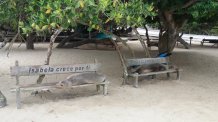
Animals have replaced tourists in once-busy parts of Isabela Island Photo: Carolina Proano
Galapagos tourist guides are being retrained to catalogue the islands' famous biodiversity.
The COVID-19 pandemic has left many eco-tourism workers unemployed, and the "Barcoding Galapagos" scheme will see them survey wildlife and plants using "genetic fingerprinting".
The project – run by the University of Exeter (UK), the Galapagos Science Centre and the University of San Francisco de Quito (Ecuador) – has received funding from UK Research and Innovation (UKRI) through the Global Challenges Research Fund and the Newton Fund.
It is one of 20 projects funded by UKRI in a "quest to develop solutions that will mitigate the short and long-term social, economic and health consequences of the pandemic".
Barcoding Galapagos will employ a manager and about 80 guides in a range of part-time and full-time positions for nine months each.
"Our vision is to train and employ naturalist guides to catalogue the biodiversity of Galapagos – from microbe to mammal – using 21st Century molecular approaches," said Dr Camille Bonneaud, of the Centre of Ecology and Conservation on Exeter's Penryn Campus in Cornwall.
"These guides are central to economic recovery for a population almost entirely reliant on eco-tourism, and they will receive immediate capacity-building training and employment in sampling, curation and the latest genetic techniques.
"Our proposal therefore is a win-win because it will also fill important gaps in our biological knowledge of the islands."
Professor Jaime Chaves, of the University of San Francisco de Quito, said: "This is the first barcode project in the Galapagos of this magnitude.
"All the data will be generated entirely by local people, and processed within the islands.
"I do not think there is anything like this project anywhere in the world."
Prof Diana Pazmiño, of the Galápagos Science Centre and the University of San Francisco de Quito, said: "This is an incredible opportunity for me as a local scientist to share knowledge about genetic tools and its potential to contribute to the conservation of the Galapagos biodiversity.
"Both the social and scientific implications of this project are extremely valuable for the islands and its community."
Dr Tomas Chaigneau, of the University of Exeter, added: "Without revenue from tourism, conservation efforts in the Galapagos could be under threat.
"By providing an alternative source of income to naturalist guides, this project can lessen the negative impacts of illegal harvesting and strengthen park protection in the short to medium term.
"This in turn can ensure the fine balance between biodiversity and wellbeing of local inhabitants is maintained in the long term."






